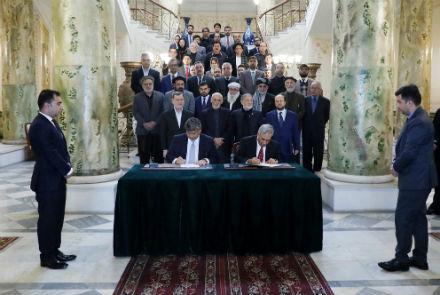The Asian Development Bank (ADB)on Thursday signed a memorandum of understanding (MOU) for a series of energy projects, which will help Afghanistan enhance energy security and efficiency, boost energy supply, and strengthen the country’s cross-border trade in energy.
President Ashraf Ghani witnessed the MOU signing held in Kabul, along with ADB Country Director for Afghanistan Samuel Tumiwa, cabinet ministers, and members of parliament, the ADB said in a statement on Thursday.
The total amount of the proposed projects is $200 million, which includes $106 million from ADB’s Special Funds and $94 million in cofinancing from the Afghanistan Infrastructure Trust Fund, established in December 2010 to provide funding for the country’s infrastructure requirements.
“Access to efficient and reliable power can help Afghanistan boost economic growth and create employment opportunities in the country,” said Tumiwa.
He said: “The projects, which have been signed, will help increase the electrification rate for Afghan households, businesses, and industry to unlock growth and income opportunities.”
Afghanistan relies on energy imports from neighboring countries to meet its domestic demand.
Despite significant progress since 2002, only about 32% of the population has access to grid-connected electricity, which increases the cost of doing business and is detrimental to the environment.
According to the statement, the proposed projects include:
• The construction of a new 500-kilovolt (kV) transmission line from Surkhan to Dasht-e-Alwan;
• Upgrading of Arghandi 500 kV substation and the construction of additional 3 x 500 kV lines bays at Dasht-e-Alwan and Arghandi substations;
• Construction of 220 kV transmission line from Herat to Shendand and 220/20 kV substation at Shendand;
• Construction of 220 kV transmission line from Shendand to Farah and 220/20 kV substation at Farah;
• Construction of 110 kV transmission line from Herat to Ghor and 110/20 kV substation in Ghor;
• And construction of 220 kV transmission from Mazar IPP to grid.
ADB is Afghanistan’s largest development partner in the energy sector with cumulative grant assistance of nearly $2.2 billion, all of which is on budget with the government.
Over the coming years, ADB will support the increase in the country’s electrification rate from 30% to 83% and lift the share of domestic generation from 20% to 67% by 2030.
ADB also plays a major role in power transmission both regionally and domestically, and promote clean energy, including through solar power.


